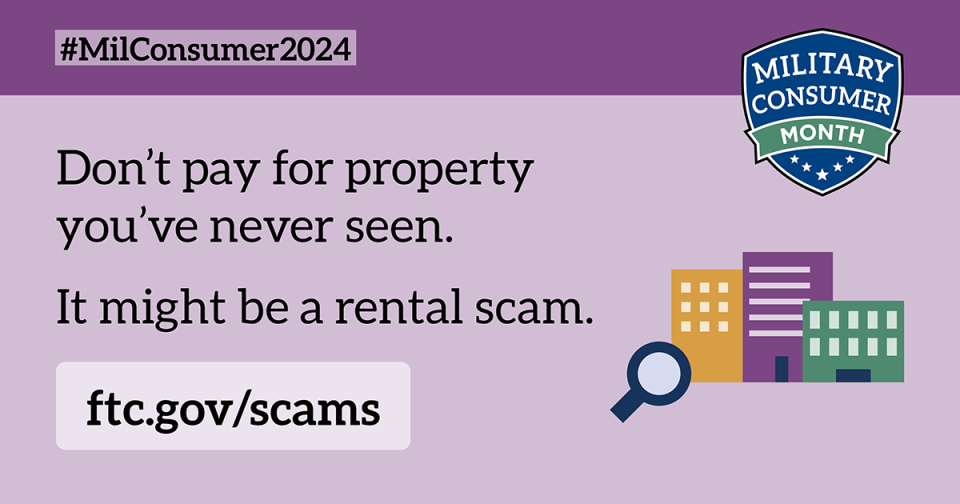Military families move regularly, sometimes every two to three years. So you may find yourself checking out new digs as you plan a move to another duty station. That’s when you could run into a rental scam, which can be hard to spot, but here are some clues.
Rental listing scams can unfold in a few ways. Scammers can steal legitimate rental listings for real places and pretend to be the landlord. Sometimes scammers use social media groups to post made-up listings for places that aren’t actually available to rent — and sometimes for place that don’t even exist. In either case, the scammer will rush you into paying an application fee, deposit, and/or first month’s rent, and promise to get you the keys right away — but instead, they’ll disappear. You’ll be left without your money and with no place to move into.
Take these steps to avoid losing time and money to a rental listing scam.
- Search online for the rental’s address, plus the name of the property owner or rental company listed. Do other ads come up for the same address? Maybe with a different owner or rental company name? Those are signs of a scam.
- Look up the rental company’s website and check to see if the property is listed there, too. If it isn’t, the listing is likely a scam.
- Pay by credit card, which gives you the best protections. Scammers want you to pay in ways that make it hard to get your money back — like with gift cards, wire transfers, payment apps like Apple Pay, CashApp, PayPal and Zelle, or cryptocurrency.
- Don’t pay for a property you’ve never seen. And never pay someone you’ve never met in person. If you can’t see the apartment or sign a lease before you pay, see if a friend can see it for you, or keep looking.


home across street for rent with lockbox and scammer listing home on Facebook for $1,000 less than rental company. SO: 1. Visit rental/ 2. County Accessor lists homeowner’s name by address/ 3. Rent thru a Realtor or Rental Company.
4. Notify police: of scammer’s ad, phone, name. 5. Put “Warning” note on door. Warn applicants
This just happened to a person in Bedford. They didn't realize it was a scam until they had sent them money and didn't get the keys as promised. She contacted me after the fact, and we discovered that a person in Indianapolis probably was the instigator of the scam. We also found out this person had over 10 felonies charged against them for similar acts. We are trying to educate our local population that this is happening and what to watch for. Your article is a good start.
I'm looking for a place. Great tips. Thank you.
In reply to I'm looking for a place… by Ronnie L.
As a realtor for over thirty years who just retired I am constantly getting calls from people who see my name attached to a Craiglist for rent advertising.. They call or text to verify that an advertisement is legit. Scammers are everywhere